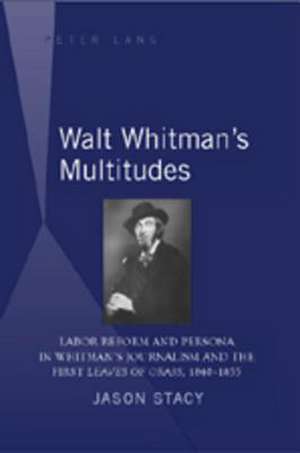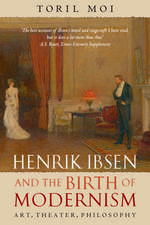Walt Whitman's Multitudes
Autor Jason Stacyen Limba Engleză Hardback – 31 mar 2008
Preț: 571.78 lei
Preț vechi: 742.57 lei
-23% Nou
Puncte Express: 858
Preț estimativ în valută:
109.42€ • 113.82$ • 90.34£
109.42€ • 113.82$ • 90.34£
Carte tipărită la comandă
Livrare economică 14-28 aprilie
Preluare comenzi: 021 569.72.76
Specificații
ISBN-13: 9781433101533
ISBN-10: 143310153X
Pagini: 168
Dimensiuni: 236 x 159 x 16 mm
Greutate: 0.41 kg
Ediția:2 Rev ed.
Editura: Peter Lang Gmbh, Internationaler Verlag Der W
ISBN-10: 143310153X
Pagini: 168
Dimensiuni: 236 x 159 x 16 mm
Greutate: 0.41 kg
Ediția:2 Rev ed.
Editura: Peter Lang Gmbh, Internationaler Verlag Der W
Notă biografică
The Author: Jason Stacy received his Ph.D. in history from Loyola University Chicago. He is Assistant Professor of U.S. History at Southern Illinois University Edwardsville.
Recenzii
"Part labor history, part biography, and part rhetorical analysis, Jason Stacy's exciting new book offers the most complete reading to date of Whitman's important early journalism. This is a book where things like the Maclay Bill, the Wilmot Proviso, Hunkers and Barnburners, the Walker Tariff, the 'sewing girls' strike, and the collapse of the artistic patronage system in the Panic of 1837 all play key roles in the development of Whitman's voice, aesthetics, and politics, leading to a richly historicized, fresh view of the inception of 'Leaves of Grass'. By offering an illuminating examination of Whitman's three earliest personae - Schoolmaster, Editor, and Bard - Stacy explains how each guise was entwined with the poet's evolving struggle to define labor, aesthetics, and social hierarchy in a democratic context. Stacy shows how Whitman thoroughly engaged the divisive political issues of his times but always assumed the unifying voice of American natural rights; trying to speak for everyone in an increasingly divided nation finally left him, as the Teacher and the Editor, with no voice, speaking to no one, and prompted him to become the Bard, who could teach everyone how his or her unique place in the society was equal to every other place. Along the way, Stacy offers convincing explanations of a number of seeming contradictions in Whitman's early writings that have puzzled critics for decades. Stacy's striking conclusion offers an overview of the adaptations Whitman made to his Bard persona in his 1856 and 1860 editions of 'Leaves', including his return to his Editor persona in his anonymous reviews of his Bard persona, as he assumed the role of the unaffected artist he had once arguedfor as the Editor. This book builds upon the work of critics like M. Wynn Thomas and David Reynolds, and it adds significantly to our understanding of how Whitman's 'Leaves of Grass' emerged from a specific set of decisive and often forgotten moments in American social history. -- Ed Folsom












